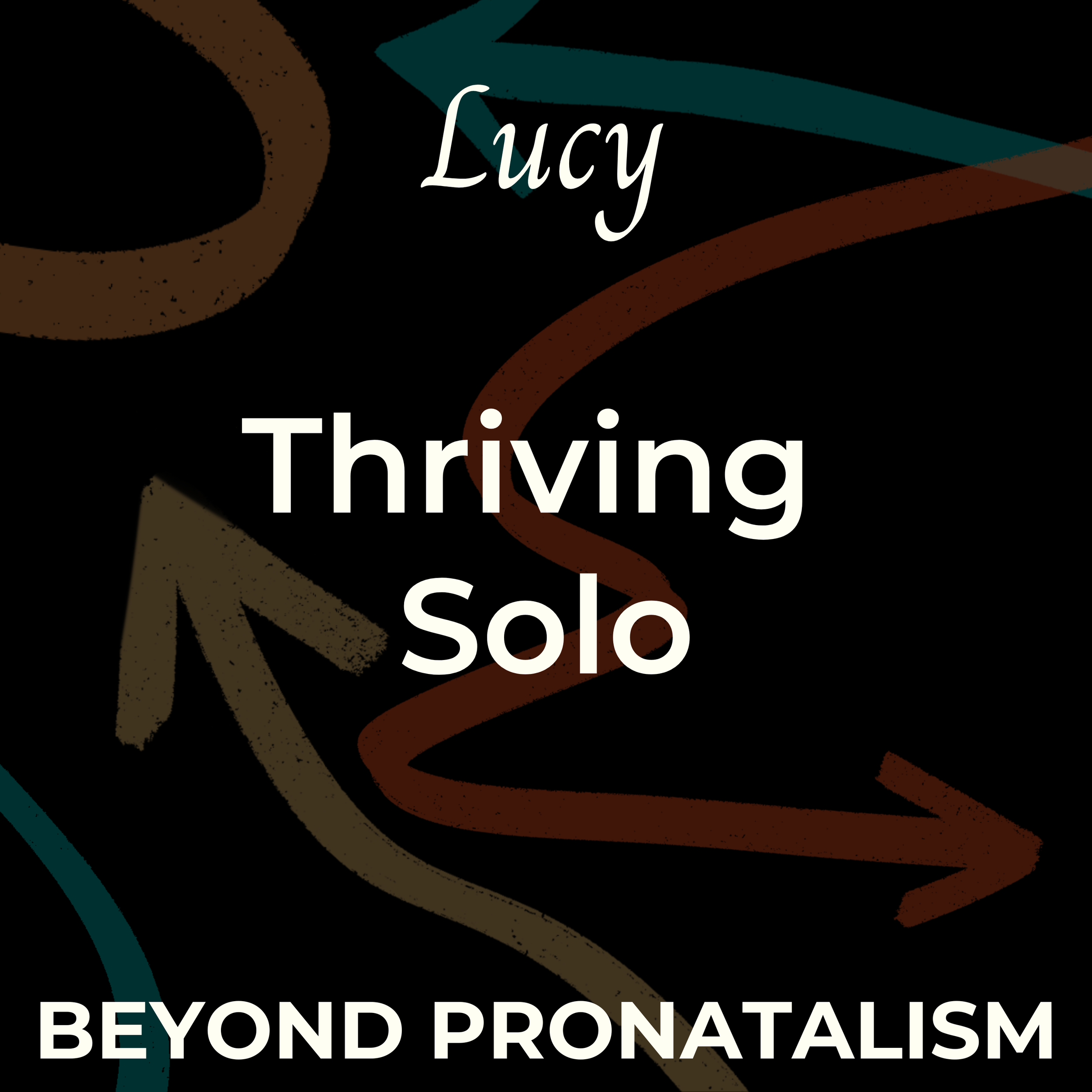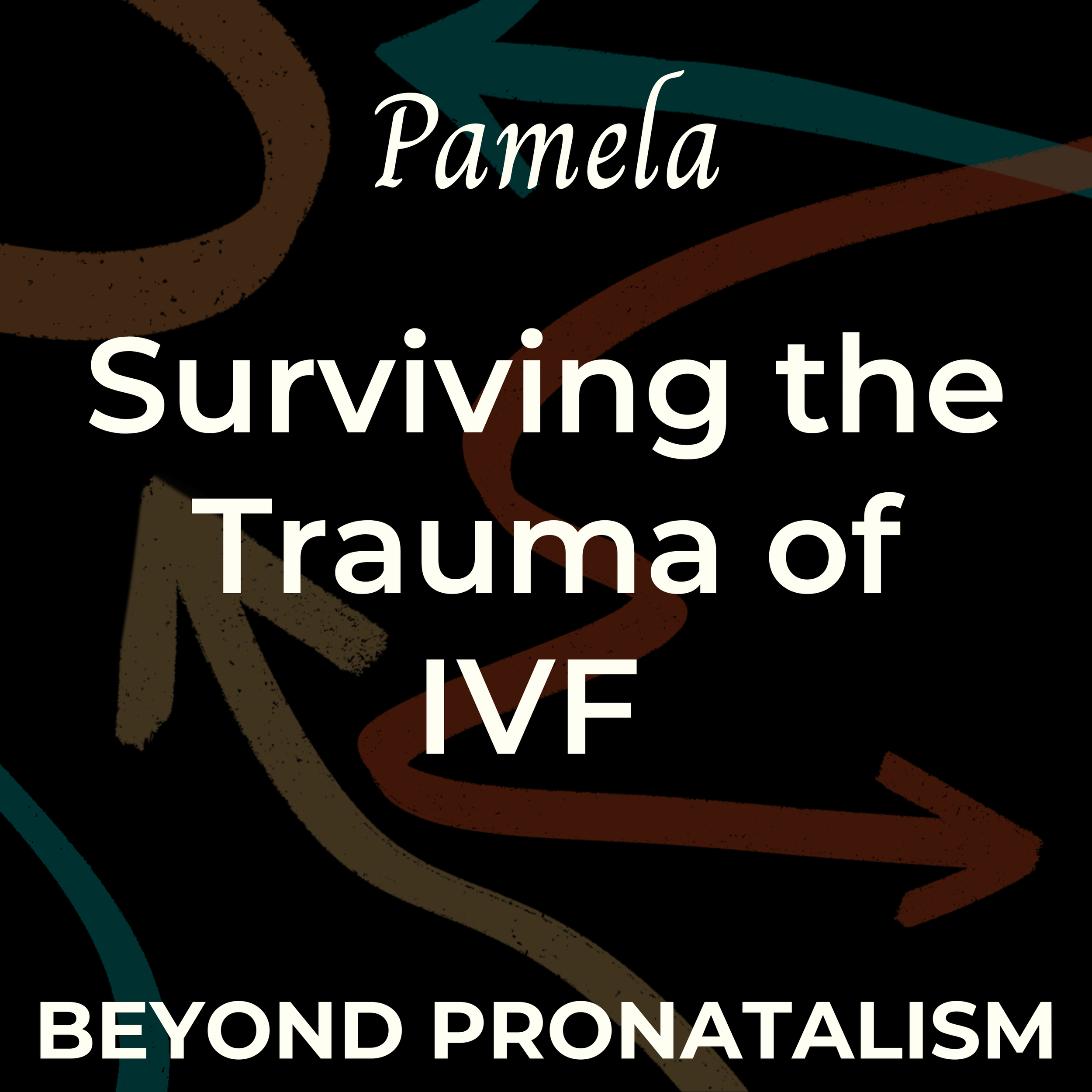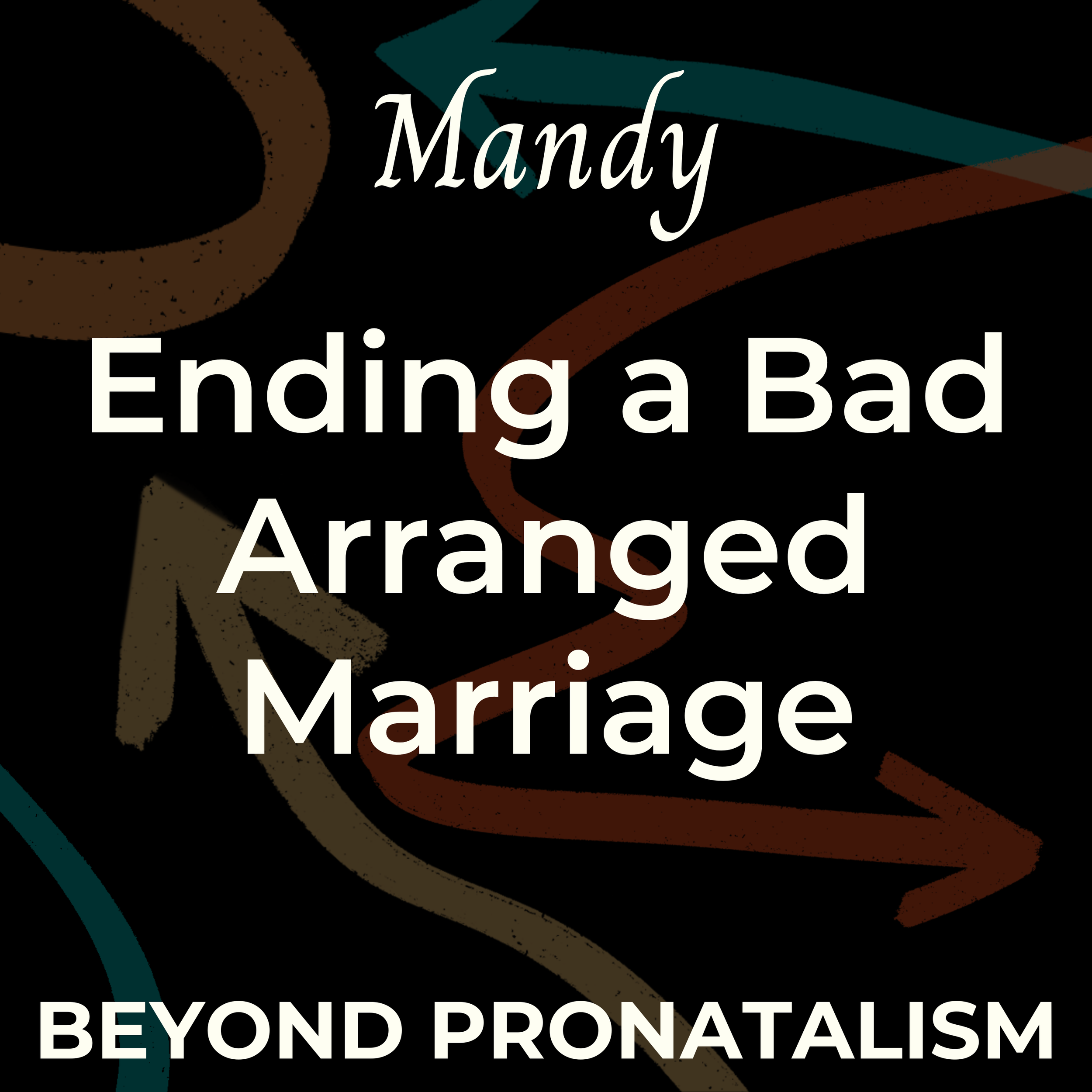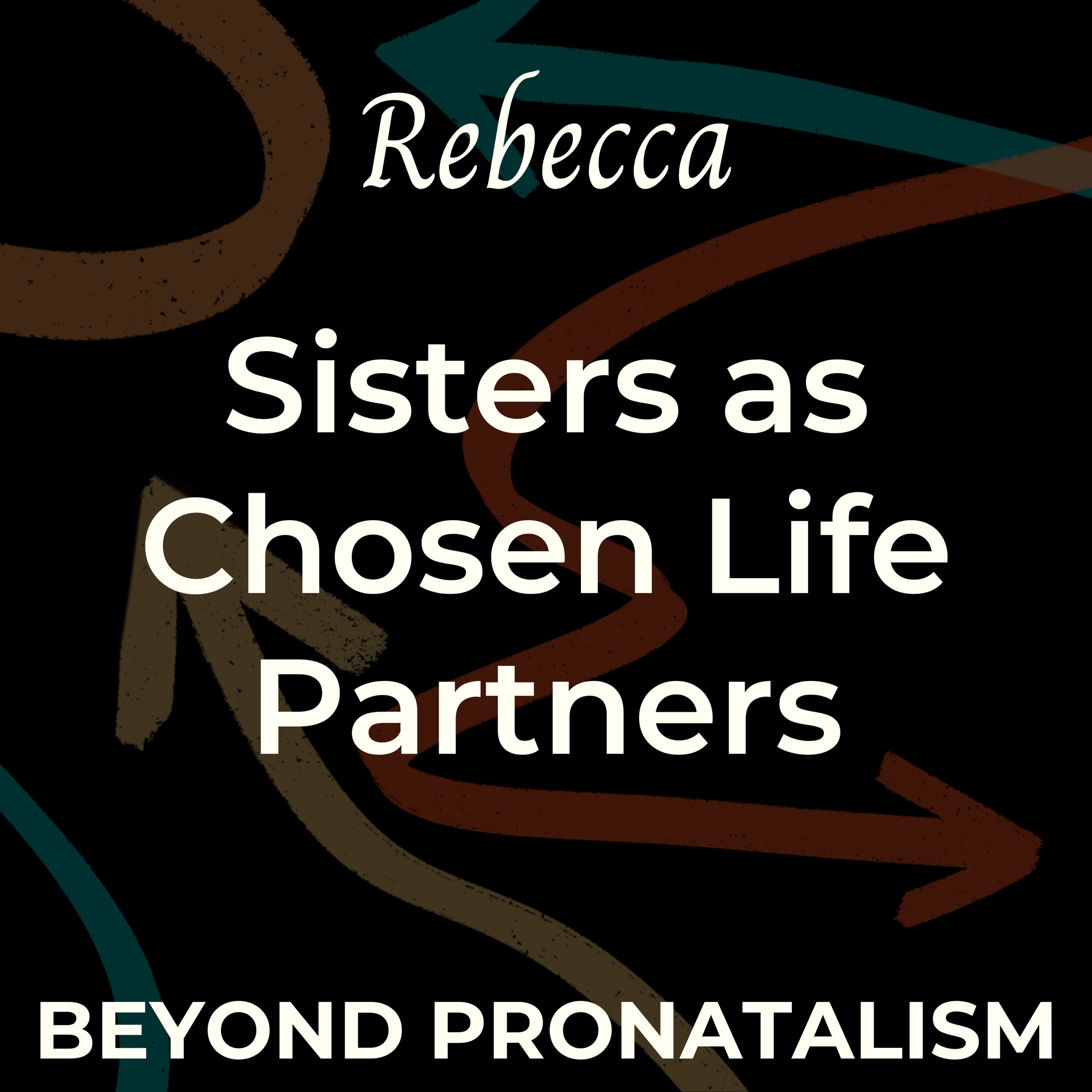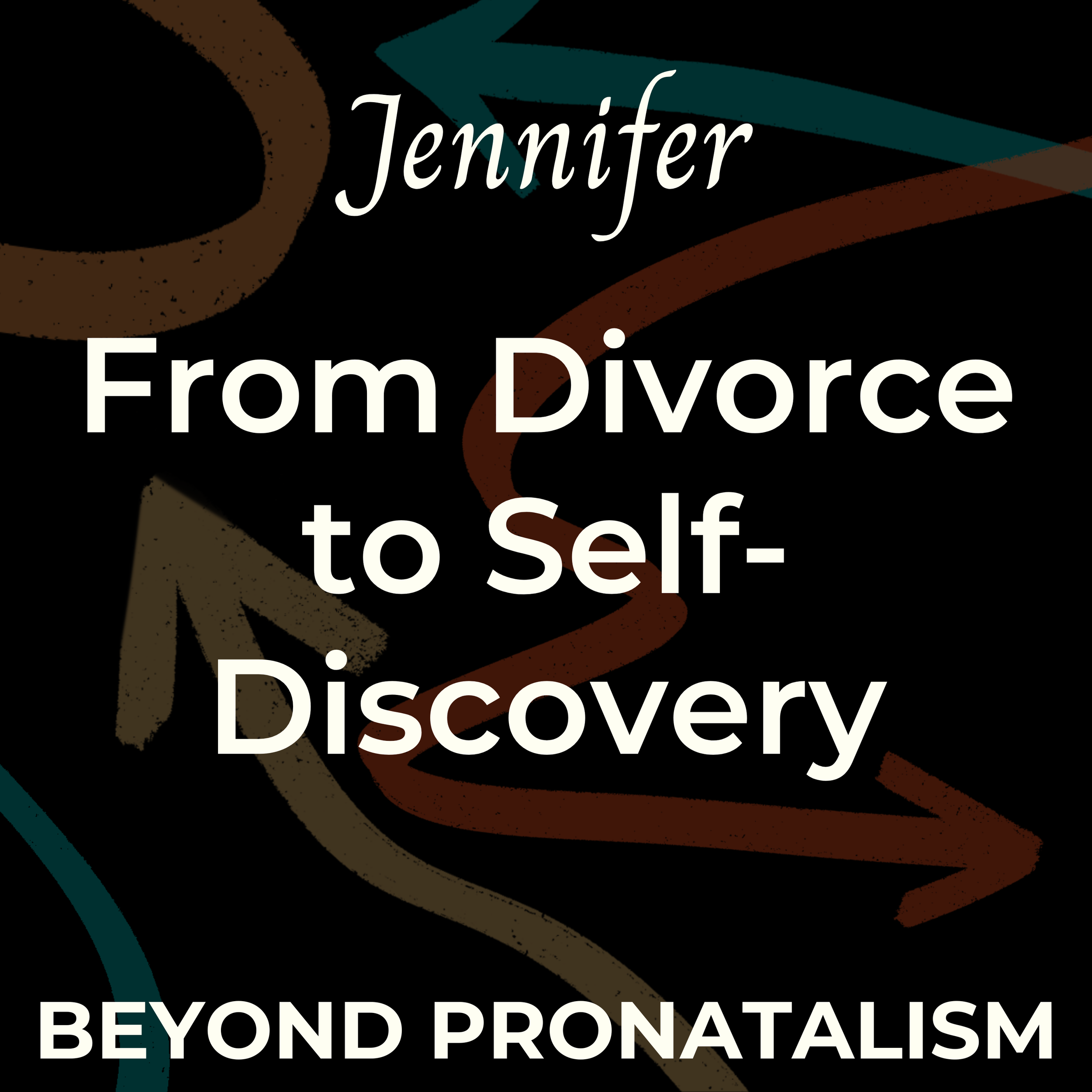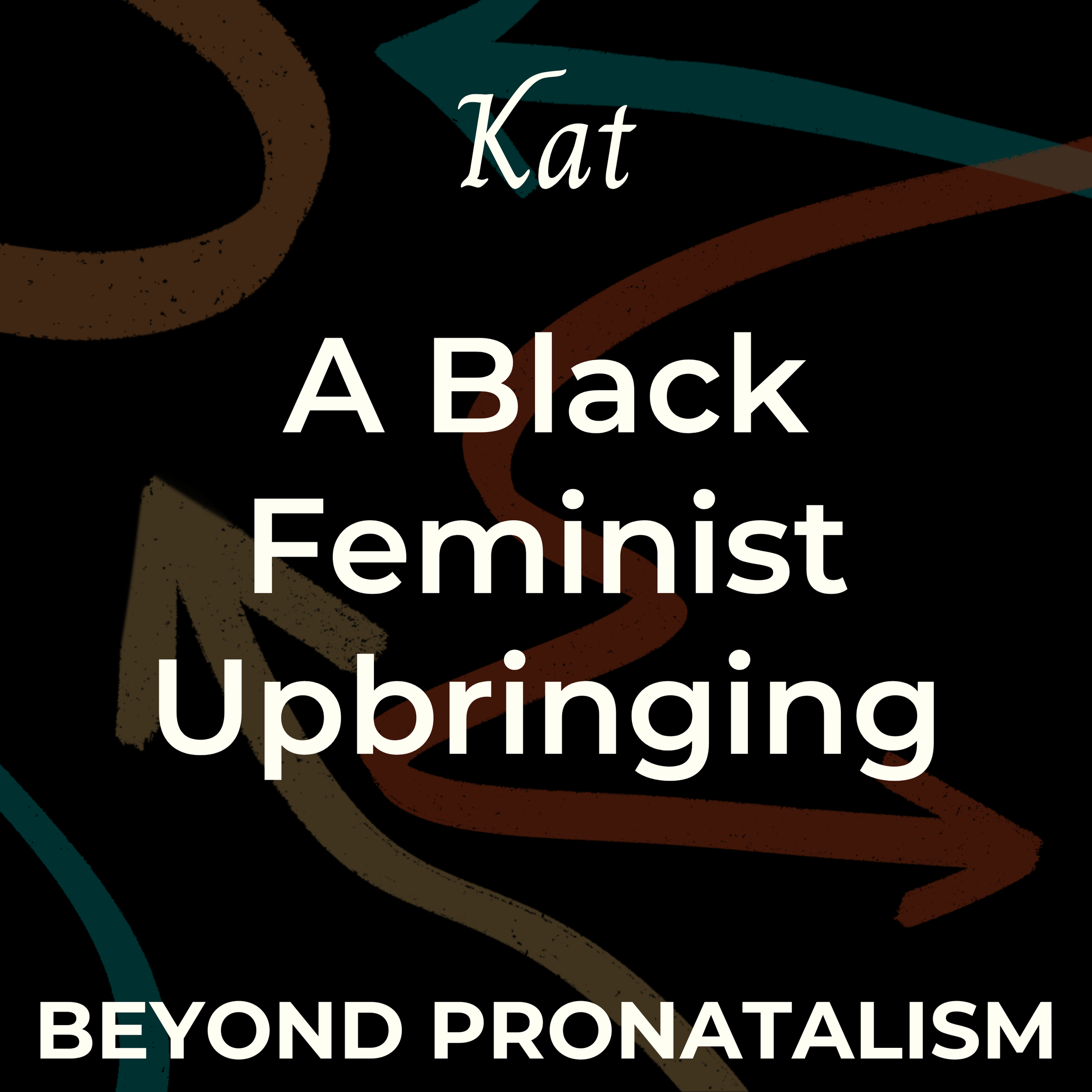Nicole | The Rich Lives of Women Without Kids
Nicole Louie grew up in a traditional household in Brazil, but knew from an early age that motherhood was not for her. When she found herself with a partner who decided he did want kids, she embarked on a journey of discovery about the many pathways life could take outside of our reproductive capacity. This journey included not only deep self-reflection, but interviewing 14 incredible women and publishing a book that tells their stories.
-
Nicole (00:00):
It was only really when I got married and had a partner who at the time didn't want to have kids, but later on had a change of heart, that I found myself in a situation where I was going to lose someone who was very dear to me because of that decision. After a while, I was having a really hard time visualizing that future. Okay, if I'm going to leave, if I'm not going to have this child, what does my life look like? I couldn't really see it because there was nobody to talk to, and that's where the second part of the book comes, which is looking at others, and it was no longer just about me and my feelings, but about being completely open to if there are other possibilities and it seems there are, I want to hear all about it.
Nandita Bajaj (00:52):
That was today's guest, Nicole. Hello everyone and thank you for joining me on this journey. My name is Nandita Bajaj and I'm the host of Beyond Pronatalism, Finding Fulfillment With or Without Kids - an interview series in which, through intimate conversations with women and men from diverse backgrounds, I explore how they are courageously and creatively navigating pronatalism - the often unspoken pressures to have children, whether from family, friends, or the culture at large. In each episode, I dive into personal stories with people who are forging unconventional pathways to fulfillment, including redefining what family means to them, whether that means being childfree or childless, having biological kids, adopting or fostering children or animals, or creating close-knit communities of friends and loved ones. Hello Nicole, and welcome to Beyond Pronatalism. I am so excited to have you here today.
Nicole (01:53):
Thank you very much for having me. I'm double excited.
Nandita Bajaj (01:57):
And Nicole, this one is a unique interview in our series because as much as you are the subject of today's interview, you will also be weaving in the stories of some other women and their lives without children as you have captured in your newly published book, Others Like Me, the Lives of Women Without Children. Congratulations on the launch of your book. It's a really well-written book and I'm thrilled to be unpacking that with you today.
Nicole (02:27):
So am I. Thank you very much for this space. I'm a huge fan of the work that you do and I do mean it. I don't say it lightly, and it's wonderful to know that you read with care, with attention, and I'm looking forward to dissecting it with you.
Nandita Bajaj (02:41):
Thank you so much, and I loved reading your book Nicole, and I could relate to so many aspects of being raised in a traditional setting and all of the traditional gender norms and expectations around what it means to be a woman. So let's begin with that. You grew up in a traditional household in Brazil and you attended a Catholic school. Tell me about the kinds of messages you were receiving as a child about your purpose in life as a woman.
Nicole (03:11):
Yeah, I think when you spend half of your days with nuns, which was my case in an all girls school, not really seeing any boys, and the only reference that you have of relationship is your parents who in my case were divorced, it can get really difficult to have an external sense of what womanhood is. So when people tell you you're supposed to beat something or do something, you believe in it. You think, well, you were the grownups, so you're telling me that. And that was happening both from my grandmother who was in a very toxic and abusive relationship with my grandfather. My mom was in a nonviolent relationship, but still a toxic one, and then from the nuns who would tell me biblical stories every day, and I do mean it, every day. We prayed every day and we always started our classes with the biblical story of the day.
(04:04):
So in the Bible, or at least in the stories that I was told, women were always mothers and any woman with the backbone was crazy, was a sinner, was a whore, was somebody who was disrupting things and the women who didn't have children didn't seem to have any agency. Nobody ever mentioned that they chose not to have. It was always the barren woman and, in the Bible, barren was synonym with not being blessed by God or being a sign of disobedience and that was a curse. So obviously not becoming a mother then meant a punishment in my head, became a synonym of, okay, so I have to be good and I have to be certain things so I don't get to be punished, so I don't then lose my womanhood, which was the name of having kids then. So it took me a long time to unpack all of that and to see other possibilities and that meant leaving my mother's house, but also leaving my country for a while and reading and then meeting the women in the book.
Nandita Bajaj (05:08):
Even though you were hearing all these messages, you kind of started to have an inkling when you were quite young that choosing motherhood was not one of the pathways that you saw for yourself. Tell me a bit about how you were navigating this inner feeling that you had, that you weren't attracted to that life path, even though that's the only path you saw all the women around you expressing. You didn't really meet women who didn't have children by choice and who were living happy, fulfilled lives when you were quite young.
Nicole (05:42):
To be honest, I think there was this very clear sense of not wanting to be a mom and telling my mother, not as specifically about that. I don't think we had that conversation when I was seven years old where I said, Hey mom, I don't want to become a mom. It was more watching her struggle a lot, being 26 and having a second child, my brother, and how that took over her whole life. She was a single mother twice to different husbands. So it was just the observation of how exhausted and unhappy she seemed in the eyes of me and my six years old self somehow meant, don't go there, don't do that. So I don't think it came from a place of deep understanding and thinking. It was more empathy and love for my mother and somehow associating her happiness with the overload of motherhood. And that's not to say that later on I didn't understand that you could be a mother and could be happy and it could be a beautiful journey, but it did take me a long time to decouple those two things.
(06:41):
I think I lived from there from when I was six to when I was about 25, 26, with that sense of not wanting a kid going completely unchallenged. My parents didn't give me a hard time at all and my mom would always say that I didn't have, and I do mention this in the book, I didn't have to believe what the nun said she could say. I just had to respect because those were the best schools in Brazil and she wanted to make sure I was having access to good education. So I think until I got married I didn't have a reason to challenge myself or to think, Why did I want that? It was just who I was and how I felt. It was only really when I got married and had a partner who at the time didn't want to have kids, but later on had a change of heart, that I found myself in a situation where I was going to lose someone who was very dear to me because of that decision and then the adult part of me thought maybe it's a good time to rethink it, not so much as to change your mind, but to understand now that you are in your late twenties is this is still how you feel.
Nandita Bajaj (07:46):
And so let's go into that a bit more. You had stayed steadfast in this knowledge that you probably would not become a mother and then this relationship made you rethink some of those questions. Tell me a bit more about that journey of you starting to feel into what some of your partner was expressing to you, that he wanted to have a child and you were starting to question whether your own certainty for so long was based in something more grounded or was it you just hadn't thought about it deeply enough?
Nicole (08:25):
Yeah, it was basically being honest with my partner and saying, I do need time to figure myself out and to figure this out. Circumstances have changed. I was in a relationship and I thought we were on the same page and now it seems we are not. Trying not to place blame on one another was also very important. People change, life happens, we get older. We were in a very loving and respectful relationship, so trying not to turn the fact that his change of heart had made things difficult for me didn't mean I had to also make things difficult for him because he didn't mean to make it hard for me. When I look back at it now, at the time, although it was really hard, there is this sense of, in a way it was a gift because it really forced me into looking very deeply inside myself in a way that I don't know I would have had, had I not been given the stay with this person and have the baby or leave and don't have the baby situation.
(09:21):
Although he never put it like that to me, it was how I felt because I was so certain that I didn't want the kid that it was obvious that I would have to leave if I continued to feel this way. It was also very open to me not changing my mind and us continuing the relationship. The pressure was coming from myself. He never pressured me. It was more like if this person wants to have a child, I should be out of his way. I shouldn't be keeping him sort of thing. But then to go through my whole family history, think more about the history of my mother as a single mom, as somebody who got pregnant at 18, left her house at 14, suffered a lot of things in the streets, domestic violence relationship with my grandfather. Realizing I was the first woman in my family who had the right to choose so many things, when to get married, to whom to get married, how if I had a kid, if I did, and how many, with whom - all of those things were never really a question. And I started valuing them even more once I understood what it felt like at the time I was living in a secular country, which was Sweden, very different reality than to live in a country where you're constantly bombarded by religious messages, observing Swedish women having kids generally later as well.
(10:33):
Most of my friends in Brazil from university times already had kids and then suddenly finding friends, even their mid-thirties didn't have kids yet. And maybe they would, it's just that they were giving themselves time. They were allowing themselves to have an education, to travel the world. The concept of a gap year was something that I noticed a lot among my friends. They would take time to travel to see other cultures. So these are all women who are growing the world where possibilities are being offered and I was taking all of that in and I was like, I'm grateful that I have a partner that is allowing me also the time to figure this out. That was the first section of the book, looking back, figuring all of that out. But for myself, after a while I was having a really hard time visualizing the future. Okay, if I'm going to leave him and if I'm not going to have this child, what does my life look like? I couldn't really see it because there was nobody to talk to and that's where the second part of the book comes, which is looking at others. And it was no longer just about me and my feelings, but about being completely open to if there are other possibilities, and it seems there are, I want to hear all about it.
Nandita Bajaj (11:40):
Yes, and I love the diversity of the others whose lives you covered. You tell the stories of 14 other women from different countries, different social statuses, religious beliefs, and different age groups from 25 to 65 you said, and some who had decided to not have children by choice and some by circumstance, but all of whom were living deeply meaningful lives. I'd love to hear some of those stories. Can you give us some highlights of each of these women and how you came across them? What is it that you found uniquely different about each of their lives?
Nicole (12:24):
That's a good one. I'm not sure I'll be able to cover each and every one of them. I think the thing about this sample that I chose, I did interview 33 women for the book and then 14 made it, not out of being best stories or better stories, but just really trying to show a sample that was diverse enough in different directions. So like you mentioned, women who chose, women who couldn't, but also women who are still choosing. I thought it was important to add those journeys as well. So the possibility of becoming a mother is still in the book for those who want the journey of deciding. I didn't want the book to read as an antinatalist book or a book that is telling you there is no other way to be happy and that you only be free if you don't have kids.
(13:08):
I don't actually believe in that. I think there are different types of freedom and fulfillment that we can find inside and outside of motherhood. So the 14 ones were a way to show different social classes, different occupations, different sexual orientations as well and how that shapes your life and how you're finding fulfilling within those contexts. So quickly looking at the table of contents, we have Lucy, who is a British translator at the time was 45. Then we have Elena who was Venezuelan and is a graphic designer, Burcak, who is Turkish and is an academic. I adored her story. Burcak, was the first Turkish woman to climb Everest and I will never forget the goosebump I felt when in the cold just like this seven years ago, she said to me, yes, I really want to climb the ten tallest mountains in the world. I thought, okay, so that's how you're going to be spending your time and it's just like, yes, and I already climbed the first two.
(14:11):
I was like, which one is like Everest? There was this sense with the interviews where I really tried to know as little as possible before the interviews because I wanted to be surprised by it and I wanted to go with the flow in the conversations, but I still remember the sense of awe with Burcak, because her life is so incredibly different from mine. She's so physical and I'm chronically ill. I have asthma, I'm always sick. I'm like my body's very fragile and very broke and I'm very strong in my mind and very mentally and psychologically strong, but my body is taking all the hits. So to sit across from a woman who is going, yes, I'm going to climb all of those mountains, it was a wonderful way to be inspired by her story.
(14:55):
There is Candice, who is Rhodesian. At the time it was called Rhodesia. Now it's called Zimbabwe. She's a psychosynthesis therapist, so even just the different ways they make their living. Andrea, who is Peruvian and who is an anthropologist. Andrea is neurodivergent, she's autistic, she's bisexual, she's an atheist. So just reading her biography, I'm like, can we please talk? There's so much I want to learn from you. Janka is Hungarian is a software engineer. Jóna is Icelandic and she's an actor and musician and she specializes in creating songs and singing for children, which I love because it really breaks part of that stereotype of us not liking children, which is perfectly fine. Many don't or don't know how to interact. Sometimes it doesn't come from a place of dislike. It comes just, I don't know how to interact with children. I don't know what to do with them and that makes me feel uncomfortable. So I prefer not to be around, but I thought it was good to have somebody who is saying, No, I actually like to spend time with them, but I just don't feel like I have to have my own.
(15:59):
Sherryn is Thai, she is a gold jewelry shop owner. Kay is Canadian. She is blind and she travels the world. She was in my house two weeks ago here in Ireland all the way from Canada, her second visit. Doreen is Ghanaian, an international development professional. I love Doreen's story. Doreen has a master's in peace studies and she has this beautiful passage that I quickly read where she says, 'My master's was in peace studies, an interdisciplinary field where the main idea is that peace is more than just no war. A peaceful society in peace studies theory is one in which all people's human rights are respected. This means that, for example, any society in which there are people living in poverty is not a peaceful one.
(16:47):
Poverty is a type of violence. Throughout the course we looked at how to build societies through policy and programs and that theory, literature and history concerning how to build societies that actually are peaceful beyond not having war or conflict. I remember sitting at her house in Geneva several years ago. I was living in Dublin and I went there to visit her in her apartment and we are under this huge trombone case that she also plays in her spare time and it's this woman who was born in Ghana but grew up in Japan, did her university in the west, ended up in the UK and now is in Switzerland with a master's in peace studies. And what an amazing journey, what a fantastic human being, right? I've learned a lot from her story and I think often about this sense of peaceful societies also meaning live and let others live and that includes having or not having children and that includes the choice, the right to choose reproductive rights. Magdalena is Swedish, Daniela is American jazz singer. There is Nannette, who is a British nurse in her sixties, wonderful, fantastic, funny human being, and Cecilie, who is Norwegian. So those are the 14 women.
Nandita Bajaj (18:06):
I love that. And how did you decide to choose each one of them? How did you find them and what made you decide to want to feature their stories in your book?
Nicole (18:20):
In the beginning I was specifically trying to find women who chose not to have kids. I think my starting point as a researcher was a selfish one. I wanted to validate my own choice, so I wanted to meet people who I also chose so I could be like, oh great, so you also feel how I feel. So I was quite biased and probably flawed and it's a good thing that I wasn't doing a PhD there. What I realized quite early on, maybe five, six interviews in was even when I was interviewing women who just like me chose not to have kids, their reasons for choosing were so different than mine. That opened my mind to nuance of our stories and to our individuality and how we are put in this box as everybody who doesn't have kids feels the same, thinks the same way, does the same thing goes about in the world with all the stereotypes that we think - being selfish, not caring about others, and I'm going, No, actually even within the bucket of not wanting by choice, there is so much difference and there is so many different ways to spend our time, our energy, our money, how we envision our future and how we see ourselves.
(19:34):
That then I started thinking, what happens if I start adding people who couldn't have into the sample? What can I learn from them? Because one of the things that hit me was I was worried about going through life with a lot of judgment. There is this beautiful quote by Virginia Woolf where she says, the eyes of others are our cages. And while reading her diary, which is right here - I read a lot of diaries from women writers while doing research for this book - I kept being hit by this feeling of, I'm writing this book out of a fear of being isolated and excluded from society, but I'm just talking to people who are like me. So where is my own empathy? How can I expect others to empathize and to understand me and how different we are and that we can still be friends or neighbors or support each other somehow when I'm not doing this beyond those who chose.
(20:27):
So that's when I kind of became open to, if you don't have kids, I don't really need to know the why until the interview. It doesn't matter before I don't to need to select it. So beautiful things started happening then when I let go of asking people, okay, I'm interested in interviewing you because I heard you don't have kids, but do you have because this or because of that. What started happening was the quality of the interviews was also enhanced because I was going completely open to whatever that was going to be and I was having to exercise this empathy from the beginning instead of influencing them or leading them or hoping that they would say something that I was expecting. And then you have stories like Magdalena who wanted to have a kid more than anything in life, Swedish skin therapist in her forties who had just gone through a battle with breast cancer and had to stop her third round of IVF because this was not compatible with her treatment.
(21:22):
And then a completely different story, right, a person who more than anything wants to have a baby. I more than anything don't want to have a baby. And we are there sitting across from each other finding space for those emotions, finding space for very different stories and being more than just nice and distant about it, but really trying to support each other in our differences. And it's not always nice and pretty. It was quite confrontational sometimes, just emotionally, because she would say, I don't understand you. I understand what you are saying. I can hear the words about you not wanting kids, but I don't understand how someone could feel that way because I go home and I think, where are my children? I miss them. She would say that. So it's just incredibly different, right? But this is a person who helped me hugely when I needed years later, when I had nowhere. I divorced my first husband because decided not to have the kid, lost my visa, which was a family reunion visa, had to go somewhere for a while until my visa was processed and I decided to go to Sweden, which was like home at the time.
(22:30):
And I called her and I said, do you know anyone who can I spend time with? And she found a friend and I spent three weeks in one of her best friend's house. So again, even within the difference in journey and in feelings, you still find humanity and compassion and sisterhood. So I think the set of women who couldn't have children, not just from involuntary infertility, there was a woman who was blind, another who has multiple sclerosis. It was through them I think that I learned the most.
Nandita Bajaj (22:58):
Yeah, I appreciate so much the point that you're making about not wanting to write a book that would further alienate those who are without children by choice and to kind of band together, but still be an alienated group, but rather to, I love that you said you know, we can still be neighbors. We can still be friends. We want to be in a unified society where all choices are welcomed and embraced and the motivation behind your book and wanting to cover the stories of people who are without children by choice or circumstance, but also people who are figuring that out for themselves.
Nicole (23:38):
I so appreciate that. I've been hit again and again with this feeling of compartmentalization that sometimes people do even think and you're coming from a good place and doing in the right way. I'm looking for book clubs because what I really, really want to do is to have more meaningful conversations about the meaningful conversations I already had so we can all have conversations like the one you and I are having, and one of the replies I got within 10 minutes after sending an invite to a book club for a childfree group was, basically, this is a space where we are completely childfree and we don't want to hear about the childless stories and I completely understand the boundaries that that group is setting. I don't have a problem with that. It's more, it was almost like she took offense of how dare you bring a book that is not only childfree into the circle, and I thought one of the reasons why it took me 14 years to finish this book was my stubbornness to refuse to package it in an easy way.
(24:42):
It would have been so easy and it would actually have saved a decade of my life if I had done only the childfree stories because I had all of them 10 years earlier. I started with only the childfree stories and then I went through the childless ones and then I had all the ambivalent ones, and then I spent another three years writing my memories for the memoir part. And then I spent two years editing everything the way that hopefully make sense and that you can take in all of those stories. It would've been so much easier to say, Hey here are 10 stories about women who don't have kids but just by, even from a publishing perspective, this book was rejected dozens of times because I had to defend the format so extensively from this very same people like the person who rejected the book club last night, which is basically coming from a, we fit right here and we don't want to think about anything else.
(25:33):
And while we respect that that's how they feel and that's what they want, I do worry about the consequences of this compartmentalized thinking from a society perspective, because if we cannot have a conversation between us as people who don't have kids, regardless of the reason why, how can we expect to protect our rights in relation to how we are taxed by the government? There are people wanting to tax us more, right? And if this happens, nobody's going to sit with you, with a form, and say, why don't you have kids, because your percentage should be related to your reason. That thinking is not going to happen. It's a form that says yes or no. Do you have kids or do you don't, and this is how you pay taxes. Or when Elon Musk comes around saying, we don't have a stake in the future and that we should lose the right to vote.
(26:24):
This is our right to vote for people who are going to represent us in all aspects of our lives. And that decides everything - our rights to housing, our right to immigrate for another country, our right to study in a paid institution or not, how our bodies are treated. There is so much that is at stake, and we are not able to have conversations with each other because we are only focusing on the personal level of our own stories. And that lack of collectiveness, that lack of holistic integrated perspective got me really worried in maybe my fifth or sixth year of research where I was no longer obsessing about my own story.
(27:07):
And I was like, okay, but what does this mean to the world? If you interview 33 women and you realize they're all very different and you go, right, so actually we don't all fit in that box. That is a huge learning. How do I show that? But if one day we have to be taxed or lose our right to vote or get fined like now in Russia, where your podcast and my book would be considered childfree propaganda. And if we were Russians right we would probably be receiving this bill saying you have to pay thousands of whatever the currency is or maybe go to prison because you are being antinatalist. This all could happen. This is already happening. It could affect all of us, but we are all in these little groups only thinking about our own pain. And I thought, how can I bring us to the surface a little bit more, which is why I added the third section to the book, which is called looking ahead, which I had not planned for in the beginning. Those 14 stories pushed me out of myself and ensure a higher concern from a societal perspective. So I brought the women philosophers, I brought bell hooks and Angela Davis and Simon Weil to the book hoping to at least spread the seed of we can all deal with our personal stories and emotions and set of challenges, but at some point it would be wonderful if we could just gather around each other as a larger group, as a larger demographic, as just humans so that we can fight for new rights and protect the rights that we already have.
Nandita Bajaj (28:46):
I really appreciate that. That is what a healthy, well-adjusted society would look like, where both choices are equally valid. And I think this compartmentalization of people who chose not to have children can also really leave out the stories of people who didn't know that they didn't have a choice in the matter. And I have interviewed people who felt compelled to have children, had them and are regretful about the decision. So sometimes elevating this one thing of choosing not to have children as like the ultimate choice of liberation or intentionality really misses the stories of so many others who are like us in every way that matters.
Nicole (29:36):
Yeah, the right to choose and the right not to have. I have many people in the events I've been doing here in Europe to promote the book where they say people like me who are choosing not to have kids but not out of not wanting kids, but because I can't afford it, because I still live with my parents, because I have three jobs and I cannot buy my own house. It is choice but it's choice out of a circumstance that is pushing them towards what I call in the book, competing circumstance. And it's not just infertility. And we have this very binary way of thinking about women without children as well, which is why either they chose and the choice is made only based on not wanting, as if this comes out of a vacuum, like just somehow you wake up one day you don't want to. It doesn't matter why or the other people who can't have biologically who would both exist. But then there are all the other people in between who are choosing, like Kay says in the book, she is blind, but she's not having kids because she's blind. She's blind and she's not having kids. And that also was spinning my own brain and broke my own bias because I had assumed when I spoke to her that she didn't have a kid because she was blind. I'm dealing with my own prejudice because I have never met a blind person that I maybe seen them in a subway, but I never had the four hours conversation. And she's going, No blind people are perfectly capable of raising children. Yes, there are challenges. Yes, there are obstacles just like in poverty or person with mental issues. And I'm like, right, tell me more.
(31:06):
And then she gives me a lecture really, and I'm going, okay, I hear you and I understand now. The same thing with Elena who is from Venezuela who has multiple sclerosis. She's choosing based on, I don't know what a pregnancy is going to do to my body and I am choosing not to find out. But it's not that having multiple sclerosis doesn't allow her to become a mother. She's still exercising choice. And then there is Cecilie who is Norwegian who had an abortion in her twenties and who is now in her late forties and who is saying that abortion made sense for the person I was then, but maybe tomorrow in my forties I'll feel differently and have the kid. So she's in the ambivalent side and what I love about her is that, actually there is a reason why she's the last interview. She gives the sense of life doesn't have to be so strict and rigid where what we decide today is going to be what we decide every day until we die.
(32:02):
I place her at the end of the book because I think for so long I spent time trying to gather data about my own life to confirm that I didn't want kids that at no point I allowed myself the thought of, well, if you change your mind in the future, that's fine too. I just wanted to kind of close the case, never thinking about it anymore, which is fine. It's what I needed them to move on. But when, after seven years of research, I interviewed Cecilie and she said, yes, but because I had an abortion then doesn't mean that I would do it today or it doesn't really matter if I will change my mind or not. What matters is that I'm comfortable with the decisions I've made so far. And I thought it was so freeing to think about it that way. And another huge thing that I've learned about the sample of interviews is the fluidity of all of our stories.
(32:49):
And we are constantly told that we are going to change our minds. And I'm not saying that that's what is going to happen to the women. Many of them already passed the fertility age, but I'm just saying things don't have to be so strict as we like to think so that our women who have these extraordinary lives like Burcak with the highest mountains and Janka, who wants to build the mathematical model to help us understand the economy. So they're very aspirational, right, but I also wanted to put ordinary lives there. I don't want it to feel like if you're not going to have a kid, you have to be a genius either. Like you could just get up, buy a groceries, go to work and watch Netflix, and that's a perfectly valid life too. So it was important for me to just put like, you're a skincare therapist, you work in an elderly care home, that's fine, that's great. This is fulfillment too. And then put the creative lives as well - Lucy, who loves geocaching, works as translator, translates other people's work so they can be read in other countries. This is also a legacy. You're using your language skills and your timing, your energy to help a body of work cross borders. And that is very communal and I love that about her. So yeah, a long time trying to find all of those classifiers and different ways twisting us in different ways.
Nandita Bajaj (34:04):
Yeah, and breaking down classifiers. Yeah, and I appreciate what you said about this trope that people who have chosen not to have children often hear is you will change your mind. And I think there is a bit of a pushback against that. It's just like, no, I know what I want. I'm confident in this. In some ways there is a desire to want to really claim that confidence because society chooses to not trust women. But at the same time, it's okay if you change your mind. And that's what I love about the stories you've captured is we don't have to get stuck in any one position and then never be allowed to pursue a different path and express that capacity to nurture and to love that we can express in so many ways. It doesn't have to come through a biological child.
Nicole (34:56):
No. And if it does, also it's us choosing to change is a very different thing than being told that we are going to change or that age is going to change and that we have no agency with our own age. A lot of the times it's like, yeah, but when you are older or when you find the husband, and then I found the husband, but when you love him or if... It is always like there is this if and that no point they're seeing us fully formed human beings who maybe just maybe know what we want and maybe just maybe we thought about it a little bit or a lot. So I do love and appreciate the confidence a hundred percent, and I was that person for the longest time and I still respect those who are like that. But at the end of the book, I wanted not to deliver a stiff identity because I didn't even feel that way anymore. I'm 41, probably won't have a child. My husband had a vasectomy two days ago. We are not having a kid. So yeah, this is more in the sense of we should all just do whatever works for us and be left with the consequences of that choice without being terrorized about it really, about what will happen.
Nandita Bajaj (36:05):
Yeah, that's what it feels like.
Nicole (36:06):
Yeah, it can feel like. My grandmother used to say all the time, but if you love him, you'll give him a child. Give him a child. I'm like, okay, so I have nothing to do with this, right? If I want a child, if it's going to be inside of me. And I think that is one of the most pronatalist sentences you'll find in society nowadays still is the verb to give and who you're giving it to. And how you're wanting and your sense of self is nowhere to be found in that statement. And it's a woman saying to another woman, so we are carrying that and we are passing that generation to generation ourselves.
Nandita Bajaj (36:43):
Totally. I mean that's what internalized pronatalism, internalized patriarchy looks like. I also appreciated what you just said a few minutes ago about this expectation that if you don't have a child, then you have to do something remarkable to prove your worth. Are you a really amazing mother or are you a really great career person? Can you just be an average person who's content with her life?
Nicole (37:14):
Yeah, that is the most important thing. If you are content, we should all be content. If what you are doing in choosing for your life doesn't harm others, and in those cases, in all of those stories, it doesn't. If anything, we have Cecilie, who is mentoring young women and making a point of making time for that. That's how she wants to spend her time. We have Doreen who has the peace studies master's degree and who is all over the place like in Senegal doing work. I follow her online and every two months she's somewhere working with communities on the ground and communities with a lot of conflicts. Not easy places to be. We have Elena whose biggest dream is to build the wellness center for multiple sclerosis people. And we have Kay who is blind and who has a podcast to learn how to use accessibility friendly technology so she could be a podcaster and talk about the experience of being blind in a world that is basically not built for her.
(38:10):
So she would talk about infrastructure, architecture, she would talk about accessibility, lack of accessibility in hotels when she travels or airports. And the podcast is called Outlook, and it's all about perspective, she says, and I love that. So many of these women are turning themselves outwards to show that there is more to them that they have reproductive capacity. Another thing that I worry about sometimes is this thing of I need to be the cool aunt. I will be the one that, oh, your kids are going to love because I need to be loved by that. And there is nothing wrong with you loving your nieces or nephews or the friends of your kids. I do love them too. But it becomes a blog or a book or personality that you then have to be that cool auntie your whole life and you have to be there and you have to compensate for things that the parents cannot do, or you have to constantly prove that you like the kids.
(39:05):
We spoke earlier because not liking kids is not acceptable. Or maybe wanting to have a date with your friend, without your kids coming is going to be very frowned upon. So what is the state of that friendship when you no longer find time as two adults to spend time together? Does it have to be a rule that you're always the two of you without the kids? No, absolutely not. But I hear and read so much about how friendships break after one of the two don't have kids, and how they have no adult time anymore unless they become this Santa Claus aunt perfect figure. And I'm like, well, maybe you don't want to be that person. Maybe you don't want to be the carer. Maybe you don't want to be the one sibling who will take care of everybody because you don't have kids and they assume you have the time and the energy to put into everybody's troubles.
(39:57):
So individuality is also that. It's not overcompensating and filling gaps that are not really ours to fill. And I certainly find myself in that situation. My brother is a younger brother who I took care for many years and now he has a kid and I will constantly find myself feeling like I have to do more because he has the kid. And then I'll stop and think, okay, but you are following in your own traps. You have to stop. Maybe people are not expecting you to do more just because you don't have the kids, so don't go and proactively do more.
Nandita Bajaj (40:32):
Oh gosh. Requires a lot of self-reflection to get there, right?
Nicole (40:36):
Yeah. It's nonstop. It is exhausting. It really is. But it's the only way to do the work that I'm hoping others will do too. Otherwise, I'm just here being a preacher and it's not really what I wanted to do. I wanted to show the things that I learned through the book and not tell people what to do.
Nandita Bajaj (40:52):
Yeah, no, you leave a lot of space open for some of these authentic expressions of identity to flourish and to come out, and I think you've succeeded to show just how much variation there is in people - people who are without children, people who are with children, people who are ambivalent. They're all unique and quite different in their own way. It's really a lack of our imagination when we try and compartmentalize parents, non-parent, childless child, childfree, because we minimize all of the other things about them that make them so unique and make them who they are. And Nicole, as we are getting to the end of our interview today, I'd like to see if you have any final words about where you're at today.
Nicole (41:38):
I've reached a point both I think biologically and just after the research where I'm a hundred percent in peace with the path that I chose. I really don't think I'm going to change my mind, nor do I want to. I do take comfort, like you said, in the open door. But I think the door is less about maybe having a child in the future, and it's more about not having a kid no longer defines me and more about what else in my life is not rigid, what else in my life is not defined by that? If I don't want to be defined by my reproductive status, then maybe I should start looking at the other parts of me, that there are dimensions of me. So I'm in a very happy place. I'm very happy to finally be able to share all of those stories with other people. My own story, which was a lot to share and more than I thought I was going to share, but I think there is a higher purpose to that. I really wanted to share all of those insights, and the only way to share those insights with the reader was to put myself on the page. There was no other way. And I'm very excited about what else I can produce and bring to this world outside of this topic. I think that's where the piece comes from. There are other things I want to do, other topics I want to talk about, other types of legacies I want to develop, and I'm very excited about what is coming next.
Nandita Bajaj (43:02):
That is such a good answer. I love that, not being defined by your reproductive status and really developing this huge portfolio of all of your different interests. This was such a great interview, Nicole. I was afraid that we wouldn't be able to cover as much because you have your own story to tell in the story of so many other women whose lives you captured in your book, but you managed to do it so nicely and more, and I'm very grateful that you chose to share your story with me and others and also those of these incredible women. Thanks so much for joining me today.
Nicole (43:41):
Thank you for making space for all of those stories. It's been an absolute joy. I really appreciate it.
Nandita Bajaj (43:47):
That's all for today's episode. Thank you so much for listening. What did you think of this episode? Do you have your own story you'd like to share? Check out the show notes to see how you can get in touch with me. Whether you'd like to share feedback about the show or a particular episode, or whether you'd like to join me on the show to share your own story, I'd love to hear from you. Thank you so much again for joining me today as we collectively discover and celebrate the many different pathways to fulfillment beyond pronatalism. Beyond Pronatalism is brought to you by Population Balance, the only nonprofit organization advancing ecological and reproductive justice by confronting pronatalism. This podcast is produced and hosted by me, Nandita Bajaj, with the support of my production team - Josh Wild, Elisabeth Strunk, Alan Ware, and Kirsten Stade.
More like this
Share your story!
Would you like to be on the show to share your own story? We’d love to hear from you!
Join our mailing list
Subscribe to our newsletter to be the first to know when a new episode is launched.








